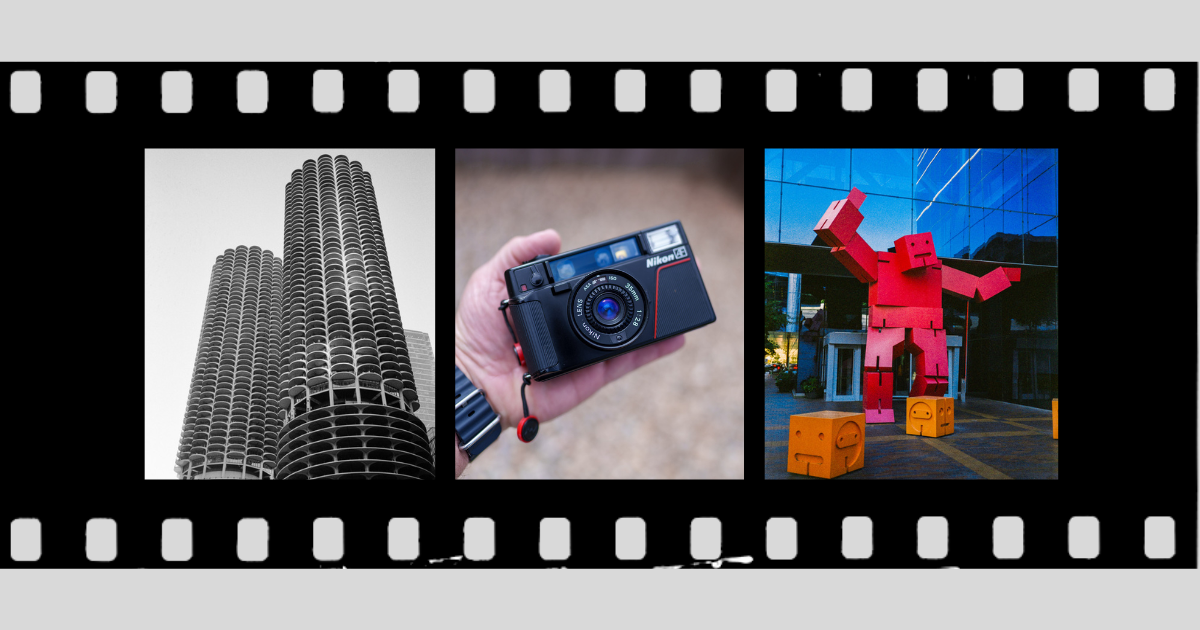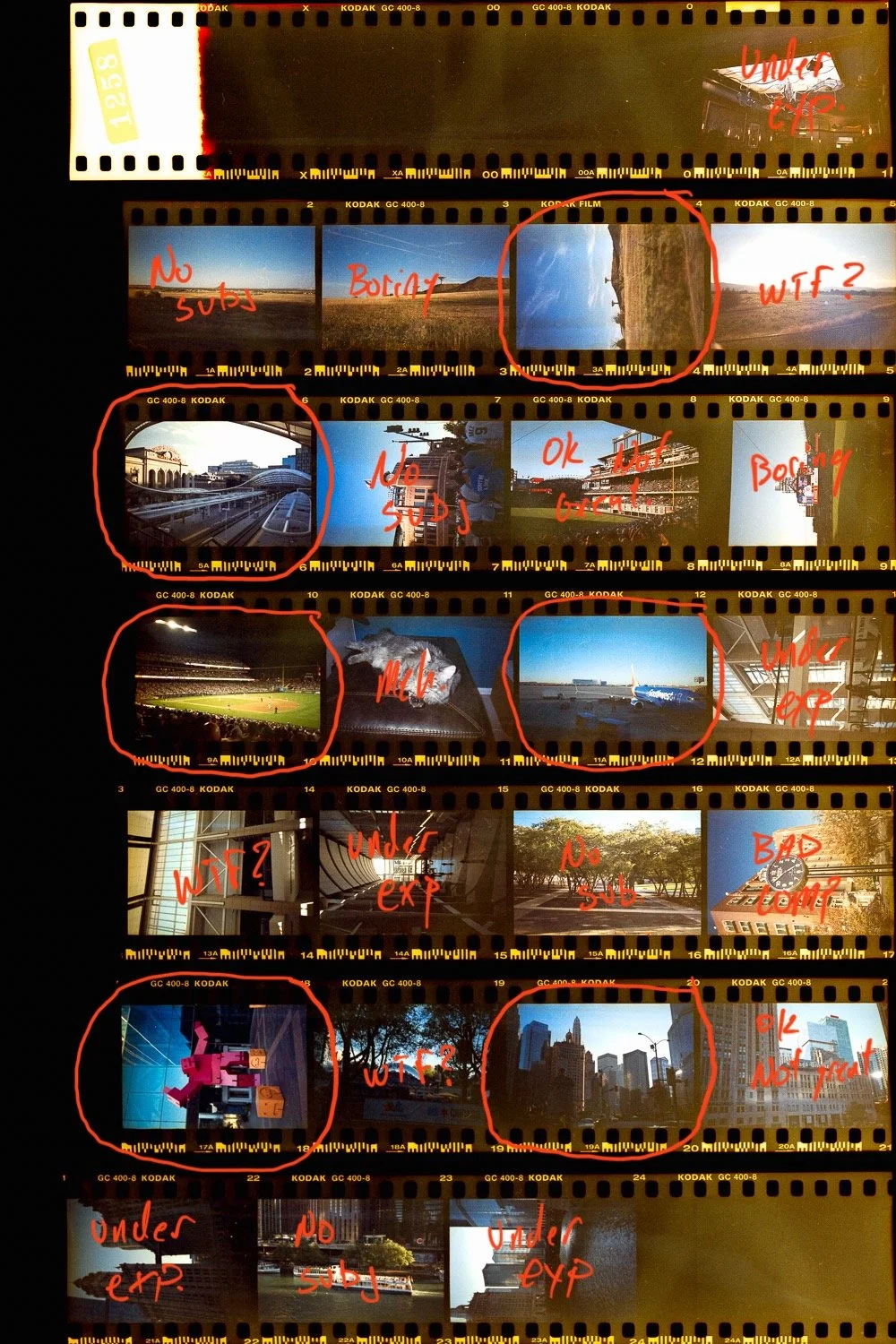An Analog Renaissance
I tried film photography again after nearly 25 years and I have thoughts.
I am what some would refer to as a Xennial.
"Xennial" refers to the micro-generation of people born on the cusp of Generation X and Millennials, roughly between 1977 and 1983, who experienced both analog and digital worlds.
I lived through the digital revolution where records gave way to tapes which gave way to CD's which gave way to MP3s which ultimately gave way to music streaming services. Landline telephones gave way to cellphones, and film cameras eventually gave way to digital cameras.
I recall taking a photography class in high school. We would hand roll some black and white film, slap it in our school provided 35mm camera and head out to take photos in and around the school. We would then come back and develop the film and make prints of our best negatives in the darkroom. I can vividly remember standing there in the darkroom watching my first ever photographic print materialize in the tray right before my eyes. It was nothing short of magic. My 16 year old self may not have realized it at the time, but I was hooked. Or at least a seed was planted. Unfortunately, the semester ended and I had to turn my school issued camera back in and I no longer had access to the darkroom. It was back to using my trusty Fujifilm Discovery 185 zoom point and shoot camera and getting my film developed at the grocery store.
In 2002, I picked up my first digital camera before going to Europe for my honeymoon. At the time, I recall being blown away by the prospect of being able to take a photo and look at it right then and there. Not having to wait until the roll was finished and you got the prints back from the lab; but right then and there before you even moved from the spot where you took the picture. Clearly, this was the future and I thought to myself, "there is no way I am ever going back to film." Digital cameras and the software to process the images evolved so rapidly over the next couple of decades it was nearly impossible to keep up: sensor size, megapixels counts, autofocus, video resolution, bit-Depth & bit-Rates, 8K and yes, even AI.
For the better part of 25 years I never gave a second thought to the old days of analog film photography. That is, until last summer when I inadvertently stumbled across the film photography side of youtube. Admittedly, at first I was like why in the world are you guys wasting your time with all of those old ass cameras? That is ridiculous, I scoffed... Also, they still make film?!? Are you serious?
But for whatever reason I kept coming back for more - my interest had been piqued. The more I watched, the more enthralled I became, and I fell backward in to a comfortable pit of nostalgia. Before it knew it I was casually surfing ebay looking at old film cameras and...
Dammit! I had been influenced.
As it turns out, I was already late to the party. While I have no doubt there are some who would say film never died to begin with, this renaissance of film photography really kicked off during the pandemic. Everyone was cooped up during during lockdown, and photography is the perfect quarantine activity. It seemed like this was the ideal time to get back into film photography. Cameras were still relatively cheap, film prices were relatively low, and film stocks that would be considered extremely rare by today's standards were still available to purchase.
Despite its recent resurgence in popularity many film manufacturers had already either stopped production or had slowed production way down. The sudden increase in interest along with manufacturing supply chain issues due to the pandemic, caused the price of film jump by about 20% in 2020 and, for some film stocks, nearly double in price by the beginning of 2024. Film prices weren't the only thing to have surged. Prices on used cameras also spiked and remain relatively high compared to where they were just a few years ago.
Admittedly, the potential expense of this endeavor was causing me to second guess my new found desire to return to shooting film. On the other hand, analog photography was a compelling challenge. Beyond that, there is a certain quality to an image captured on film that is nearly impossible to replicate with a digital camera.
With all of that in mind, and fighting the temptation to jump into the deep end of the pool and buy a Leica M6 with a 35mm Summicron lens, I decided the best course of action was to purchase a relatively inexpensive point and shoot and a couple of different film stocks and see how things went. I mean if I ended up hating it, I would only be out a couple hundred dollars rather than several thousand. Right?
Sometimes being a responsible adult sucks.
Regardless, I set out to find an inexpensive, but decent quality, point and shoot camera. After loads of research and digging through the listings on ebay, I finally pulled the trigger and became the proud new owner of a 1983 Nikon L35AF that came all the way from Japan.
I was eager to try it out and see if it worked. I mean the listing said it did, but this is ebay and at 40 years old who knows? Things that seem functional might not actually be once you get your film back from the lab. Anyway, I loaded up some Kodak Ultramax 400 that I had lying around from the early 2000's. If I was going to potentially ruin a roll of film with a non-functional camera, why use a brand new roll of film? This film had been sitting in a ziplock in my old camera bag for the past 20+ years. Not exactly proper storage, and who knows when the roll actually expired? After a little research, I figured out the rule of thumb for expired film - over expose it by one stop for each decade it is expired. So I set the iso dial to 100 and set out to get through 24 exposures as quickly as I could. We had a trip to Chicago coming up and I wanted to take my new, hopefully working, film camera with me.
I did not get through the roll before we left for our trip so I ended up hurrying to finish it up on our first day in Chicago. Hoping that everything was working properly and I wasn't just shooting blank frames, I loaded up a fresh roll of FPP X2 (black & white cinema film), slapped on a yellow 15 filter, and climbed on to a river boat for an architectural sightseeing tour. Not wanting to risk capturing the entire trip with a questionable film camera, I stopped after one roll and pulled out my trusty fujifilm x100vi for the remainder of our time there.
When we got home from Chicago, I shipped the film off to be developed and anxiously awaited the results. A few days later I received the scans of the negatives. Not only did the camera work perfectly, I even had a few photos that were, dare I say…good.
I have grown a lot as a photographer over the past two and a half decades. Without a doubt, I have my digital cameras to thank for that. "You just gotta put in the reps," as they say, and digital photography makes that part of the process both easier and cheaper than its analog counterpart.
I really enjoyed dipping my toes back in to the world of film photography. Even though it is with a point and shoot camera and I am sending the film off to the lab to be developed, there really is something special about shooting on film. In a world where digital cameras are capable of capturing an incredibly wide dynamic range so you can "fix it in post" if you don't quite nail the exposure or fire off as many photos as you want and pick the best one out of the bunch, film makes you slow down and really put some thought into both subject and composition. Because, let's face it - not only are you limited in the number of pictures you can take, but every time you click the shutter it is costing you 41¢.
Yes, shooting film is somewhat expensive. Yes, there is the delayed gratification of having to wait to finish a roll and get it back from the lab before you can see your images. Yes, there really hasn't been a new 35mm film camera to hit the market in the last 20 years or so, making "vintage" cameras the only real option if you want to shoot film. And yes, shooting on film is slower. But I feel like these limitations are what actually push you to grow both creatively and in your technical understanding of photography.
I am once again hooked. Does this mean I am abandoning digital photography in favor of film? No, absolutely not. But I am certainly going to continue shooting it. I might even eventually work my way up to that Leica M6.















